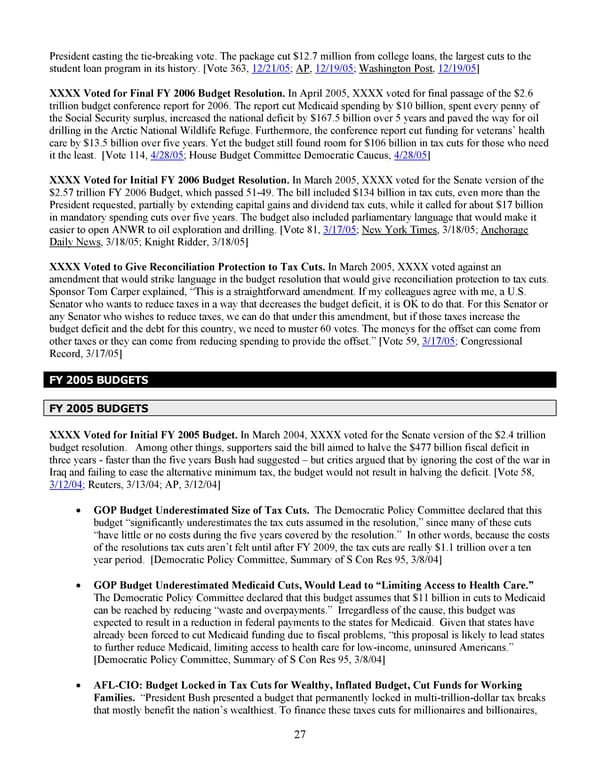President casting the tie-breaking vote. The package cut $12.7 million from college loans, the largest cuts to the student loan program in its history. [Vote 363, 12/21/05; AP, 12/19/05; Washington Post, 12/19/05] XXXX Voted for Final FY 2006 Budget Resolution. In April 2005, XXXX voted for final passage of the $2.6 trillion budget conference report for 2006. The report cut Medicaid spending by $10 billion, spent every penny of the Social Security surplus, increased the national deficit by $167.5 billion over 5 years and paved the way for oil drilling in the Arctic National Wildlife Refuge. Furthermore, the conference report cut funding for veterans’ health care by $13.5 billion over five years. Yet the budget still found room for $106 billion in tax cuts for those who need it the least. [Vote 114, 4/28/05; House Budget Committee Democratic Caucus, 4/28/05] XXXX Voted for Initial FY 2006 Budget Resolution. In March 2005, XXXX voted for the Senate version of the $2.57 trillion FY 2006 Budget, which passed 51-49. The bill included $134 billion in tax cuts, even more than the President requested, partially by extending capital gains and dividend tax cuts, while it called for about $17 billion in mandatory spending cuts over five years. The budget also included parliamentary language that would make it easier to open ANWR to oil exploration and drilling. [Vote 81, 3/17/05; New York Times, 3/18/05; Anchorage Daily News, 3/18/05; Knight Ridder, 3/18/05] XXXX Voted to Give Reconciliation Protection to Tax Cuts. In March 2005, XXXX voted against an amendment that would strike language in the budget resolution that would give reconciliation protection to tax cuts. Sponsor Tom Carper explained, “This is a straightforward amendment. If my colleagues agree with me, a U.S. Senator who wants to reduce taxes in a way that decreases the budget deficit, it is OK to do that. For this Senator or any Senator who wishes to reduce taxes, we can do that under this amendment, but if those taxes increase the budget deficit and the debt for this country, we need to muster 60 votes. The moneys for the offset can come from other taxes or they can come from reducing spending to provide the offset.” [Vote 59, 3/17/05; Congressional Record, 3/17/05] FY 2005 BUDGETS FY 2005 BUDGETS XXXX Voted for Initial FY 2005 Budget. In March 2004, XXXX voted for the Senate version of the $2.4 trillion budget resolution. Among other things, supporters said the bill aimed to halve the $477 billion fiscal deficit in three years - faster than the five years Bush had suggested – but critics argued that by ignoring the cost of the war in Iraq and failing to ease the alternative minimum tax, the budget would not result in halving the deficit. [Vote 58, 3/12/04; Reuters, 3/13/04; AP, 3/12/04] GOP Budget Underestimated Size of Tax Cuts. The Democratic Policy Committee declared that this budget “significantly underestimates the tax cuts assumed in the resolution,” since many of these cuts “have little or no costs during the five years covered by the resolution.” In other words, because the costs of the resolutions tax cuts aren’t felt until after FY 2009, the tax cuts are really $1.1 trillion over a ten year period. [Democratic Policy Committee, Summary of S Con Res 95, 3/8/04] GOP Budget Underestimated Medicaid Cuts, Would Lead to “Limiting Access to Health Care.” The Democratic Policy Committee declared that this budget assumes that $11 billion in cuts to Medicaid can be reached by reducing “waste and overpayments.” Irregardless of the cause, this budget was expected to result in a reduction in federal payments to the states for Medicaid. Given that states have already been forced to cut Medicaid funding due to fiscal problems, “this proposal is likely to lead states to further reduce Medicaid, limiting access to health care for low-income, uninsured Americans.” [Democratic Policy Committee, Summary of S Con Res 95, 3/8/04] AFL-CIO: Budget Locked in Tax Cuts for Wealthy, Inflated Budget, Cut Funds for Working Families. “President Bush presented a budget that permanently locked in multi-trillion-dollar tax breaks that mostly benefit the nation’s wealthiest. To finance these taxes cuts for millionaires and billionaires, 27
 HRC vote skeleton Page 31 Page 33
HRC vote skeleton Page 31 Page 33